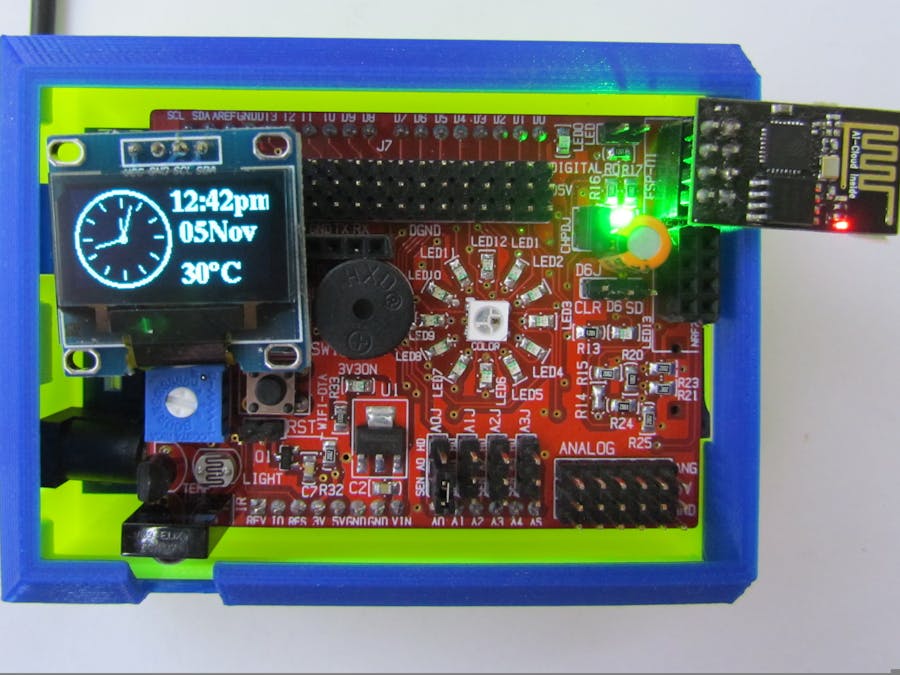// Add libraries
#include <ELClient.h>
#include <ELClientRest.h>
#include "U8glib.h"
#include <SPI.h>
#include <Wire.h>
#define BUFLEN 64
// setup u8g object
U8GLIB_SSD1306_128X64 u8g(U8G_I2C_OPT_NONE); // I2C
//
String monthArray[]= {"Jan","Feb","Mar","Apr","May","Jun","Jul","Aug","Sep","Oct","Nov","Dec"};
//int monthIndex[122] ={0,3,6,9,12,15,18,21,24,27,30,33};
String thisMonth = "";
String thisTime = "";
String thisDay="";
String AMorPM = "";
int clockCentreX = 32; // used to fix the centre the analog clock
int clockCentreY = 32; // used to fix the centre the analog clock
int tempPin = A0;
int date, hours,minutes,seconds;
int hourOffset;
int minuteOffset;
// Initialize a connection to esp-link using the normal hardware serial port both for
// SLIP and for debug messages.
ELClient esp(&Serial, &Serial);
// Initialize a REST client on the connection to esp-link
ELClientRest rest(&esp);
boolean wifiConnected = false;
// Callback made from esp-link to notify of wifi status changes
// Here we print something out and set a global flag
void wifiCb(void *response)
{
ELClientResponse *res = (ELClientResponse*)response;
if (res->argc() == 1)
{
uint8_t status;
res->popArg(&status, 1);
if(status == STATION_GOT_IP)
{
Serial.println("WIFI CONNECTED");
wifiConnected = true;
}
else
{
Serial.print("WIFI NOT READY: ");
Serial.println(status);
wifiConnected = false;
}
}
}
void draw(void)
{
// graphic commands to redraw the complete screen should be placed here
//u8g.setFont(u8g_font_profont15);
u8g.setFont(u8g_font_timB14);
// display time in digital format
thisTime="";
thisTime=String(hours) + ":";
if (minutes < 10)
{
thisTime=thisTime + "0"; // add leading zero if required
}
thisTime=thisTime + String(minutes) + AMorPM ;
const char* newTime = (const char*) thisTime.c_str();
u8g.drawStr(65,15, newTime);
//dispaly date
String newDate = thisDay + thisMonth;
const char* today = (const char*) newDate.c_str();
u8g.drawStr(70,35, today);
// const char* amORpm = (const char*)AMorPM.c_str();
// u8g.drawStr(100,35, amORpm);
// Now draw the clock face
u8g.drawCircle(clockCentreX, clockCentreY, 30); // main outer circle
u8g.drawCircle(clockCentreX, clockCentreY, 31);
u8g.drawCircle(clockCentreX, clockCentreY, 2); // small inner circle
u8g.drawCircle(clockCentreX, clockCentreY, 1);
//hour ticks
for( int z=0; z < 360;z= z + 30 )
{
//Begin at 0° and stop at 360°
float angle = z ;
angle=(angle/57.29577951) ; //Convert degrees to radians
int x2=(clockCentreX+(sin(angle)*26));
int y2=(clockCentreY-(cos(angle)*26));
int x3=(clockCentreX+(sin(angle)*(26-5)));
int y3=(clockCentreY-(cos(angle)*(26-5)));
u8g.drawLine(x2,y2,x3,y3);
}
// display second hand
float angle = seconds*6 ;
angle=(angle/57.29577951) ; //Convert degrees to radians
int x3=(clockCentreX+(sin(angle)*(22)));
int y3=(clockCentreY-(cos(angle)*(22)));
u8g.drawLine(clockCentreX,clockCentreY,x3,y3);
// display minute hand
angle = minutes * 6 ;
angle=(angle/57.29577951) ; //Convert degrees to radians
x3=(clockCentreX+(sin(angle)*(22-4)));
y3=(clockCentreY-(cos(angle)*(22-4)));
u8g.drawLine(clockCentreX,clockCentreY,x3,y3);
// display hour hand
angle = hours * 30; // + int((initialMinutes / 12) * 6 ) ;
angle=(angle/57.29577951) ; //Convert degrees to radians
x3=(clockCentreX+(sin(angle)*(22-9)));
y3=(clockCentreY-(cos(angle)*(22-9)));
u8g.drawLine(clockCentreX,clockCentreY,x3,y3);
int reading1 = analogRead(tempPin); //delay(10);
int reading4 = analogRead(tempPin); //delay(10);
int tempInCelcius = round(( 5.0 * reading4 * 100.0) / 1024.0);
String thisTemp1 = String(tempInCelcius) + String(char(176)) +"C";
const char* thisTemp = (const char*) thisTemp1.c_str();
u8g.drawStr(70,62,thisTemp);
}
void setup(void)
{
Serial.begin(9600); // the baud rate here needs to match the esp-link config
Serial.println("EL-Client starting!");
// Sync-up with esp-link, this is required at the start of any sketch and initializes the
// callbacks to the wifi status change callback. The callback gets called with the initial
// status right after Sync() below completes.
esp.wifiCb.attach(wifiCb); // wifi status change callback, optional (delete if not desired)
bool ok;
do
{
ok = esp.Sync(); // sync up with esp-link, blocks for up to 2 seconds
if (!ok) Serial.println("EL-Client sync failed!");
} while(!ok);
Serial.println("EL-Client synced!");
// Get immediate wifi status info for demo purposes. This is not normally used because the
// wifi status callback registered above gets called immediately.
esp.GetWifiStatus();
ELClientPacket *packet;
if ((packet=esp.WaitReturn()) != NULL)
{
Serial.print("Wifi status: ");
Serial.println(packet->value);
}
getTimeZone();
}
void loop(void)
{
getTime();
// picture loop
u8g.firstPage();
do
{
draw();
} while( u8g.nextPage() );
}
void getTimeZone()
{
//idiotware.herokuapp.com/getTimeZoneOffset?appid=AIzaSyARAKu23k_1vltEKesq6REtMSIflQ3c3jo
// Set up the REST client to talk to www.timeapi.org, this doesn't connect to that server,
// it just sets-up stuff on the esp-link side
int err = rest.begin("idiotware.herokuapp.com");
if (err != 0)
{
Serial.print("REST begin failed: ");
Serial.println(err);
while(1) ;
}
Serial.println("EL-REST ready");
// process any callbacks coming from esp_link
esp.Process();
// if we're connected make an HTTP request
if(wifiConnected)
{
// Request /utc/now from the previously set-up server
rest.get("/getTimeZoneOffset?appid=AIzaSyARAKu23k_1vltEKesq6REtMSIflQ3c3jo");
char response[BUFLEN];
memset(response, 0, BUFLEN);
uint16_t code = rest.waitResponse(response, BUFLEN);
if(code == HTTP_STATUS_OK){
Serial.println("ARDUINO: GET successful:");
Serial.println(response);
signed long offsetTime = atoi(response);
hourOffset = offsetTime/3600;
minuteOffset = (offsetTime%3600)/60;
Serial.println(hourOffset);Serial.println(minuteOffset);
}
else
{
Serial.print("ARDUINO: GET failed: ");
Serial.println(code);
}
}
}
void getTime()
{
// Set up the REST client to talk to www.timeapi.org, this doesn't connect to that server,
// it just sets-up stuff on the esp-link side
int err = rest.begin("www.timeapi.org");
if (err != 0)
{
Serial.print("REST begin failed: ");
Serial.println(err);
while(1) ;
}
Serial.println("EL-REST ready");
// process any callbacks coming from esp_link
esp.Process();
// if we're connected make an HTTP request
if(wifiConnected)
{
// Request /utc/now from the previously set-up server
rest.get("/utc/now");
char response[BUFLEN];
memset(response, 0, BUFLEN);
uint16_t code = rest.waitResponse(response, BUFLEN);
if(code == HTTP_STATUS_OK){
Serial.println("ARDUINO: GET successful:");
Serial.println(response);
String data(response);
thisDay = data.substring(8,10);
// thisDate = atoi(date.c_str());
String month = data.substring(5,7);
int currentMonth = atoi(month.c_str());
switch(currentMonth)
{
case 1: thisMonth = monthArray[currentMonth-1];break;
case 2: thisMonth = monthArray[currentMonth-1];break;
case 3: thisMonth = monthArray[currentMonth-1];break;
case 4: thisMonth = monthArray[currentMonth-1];break;
case 5: thisMonth = monthArray[currentMonth-1];break;
case 6: thisMonth = monthArray[currentMonth-1];break;
case 7: thisMonth = monthArray[currentMonth-1];break;
case 8: thisMonth = monthArray[currentMonth-1];break;
case 9: thisMonth = monthArray[currentMonth-1];break;
case 10: thisMonth = monthArray[currentMonth-1];break;
case 11: thisMonth = monthArray[currentMonth-1];break;
case 12: thisMonth = monthArray[currentMonth-1];break;
}
String hour = data.substring(11,13);
hours = atoi(hour.c_str());
String minute = data.substring(14,16);
minutes = atoi(minute.c_str());
int hoursInMinutes = hours*60;
hours = hours + hourOffset-1;
if(hours>12)
{
hours = hours%12;
}
minutes = minutes + minuteOffset;
if(minutes>=60)
{
minutes = minutes%60;
hours += 1;
}
String second = data.substring(17,19);
seconds = atoi(second.c_str());
if(((hours - hourOffset)%24) > 12 )// minutes >= minuteOffset)
{
AMorPM = "am";
}
if(((hours - hourOffset)%24) <= 12)// && minutes >= minuteOffset)
{
AMorPM = "pm";
}
Serial.println("hours: ");
Serial.println(hours);
Serial.println("minutes: ");
Serial.println(minutes);
Serial.println("seconds: ");
Serial.println(seconds);
}
else
{
Serial.print("ARDUINO: GET failed: ");
Serial.println(code);
}
}
}




_ztBMuBhMHo.jpg?auto=compress%2Cformat&w=48&h=48&fit=fill&bg=ffffff)

















Comments